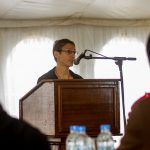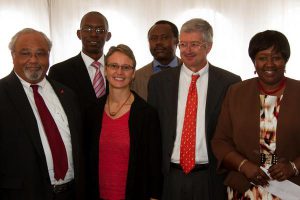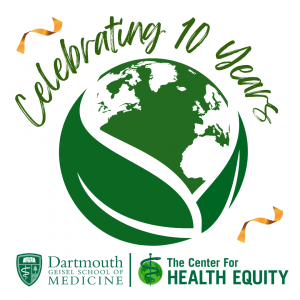 Note: The following is a speech about the HRH program that Dartmouth's Dr. Lisa Adams gave in October 2012 to a group which included two U.S. ambassadors and top Rwandan health officials.
Note: The following is a speech about the HRH program that Dartmouth's Dr. Lisa Adams gave in October 2012 to a group which included two U.S. ambassadors and top Rwandan health officials.
It is my distinct pleasure to say a few words on behalf of the US faculty – the physicians, nurses and health managers - involved in the HRH program.
First, let me say we have been warmly welcomed by our Rwandan colleagues, and, as promised, put right to work in the respective teaching hospitals and schools where we have been placed.

At our sites, we have found committed faculty members, and enthusiastic post-graduates and students, eager to learn and hone their medical knowledge, management and clinical skills – several of whom have already distinguished themselves as showing great promise to be the future leaders of this country’s health care system. We know that medical and nursing training requires a combination of self-directed learning, lectures, case discussions and practical experience. Therefore, we are in the trenches working side-by-side with our colleagues and trainees - making daily ward rounds, working in the operating theatres, assessing patients in the emergency department and assisting with morning report discussions of complicated clinical cases.
Recognizing that clinical teaching is most effective in the context of patient care, direct, hands-on bedside teaching was wisely made one of the main mandates of the HRH program. My US faculty colleagues and I strive to model this behavior and to actively engage learners at all levels in delivering the highest quality of care.
We also are finding the best ways to support and bolster our Rwandan counterparts – or “twins” as they are referred to in this program – to enable them achieve their professional goals as, health managers, or nurse- or physician-educators.
In cases where twins share academic interests, the pairing has been particularly effective. In the Internal Medicine Department at CHUK where I work, the Rwandan and US twins are in the process of designing clinical and operational research projects to evaluate issues of health care delivery with an eye towards quality improvement. This has allowed us to dig in deeper on some of the critical questions and concerns expressed by our twins in their areas of interest. In all the departments, we have had opportunities to support programmatic activities such as restructuring post-graduate rotation schedules and curricular development.
In addition to the professional development of our twins, I must mention what the opportunity to participate in the HRH Program has meant to many of the US faculty. As a cohort who has engaged in global health activities throughout our careers, we are all deeply committed to sustainable health system strengthening and capacity building.
The HRH program has provided us the unique opportunity to act on this commitment – and to stay for an extended period in Rwanda - without having to sacrifice our academic positions at our home universities. This is a powerful indicator of the value that our respective institutions have placed on long-term global health engagement – which is a significant step in the process of professionalizing the field of global health.
Of course challenges exist in our work as well. There are systems challenges and infrastructure and equipment needs that impact our ability to perform at maximum capacity. We anticipate that many of these needs will be addressed through the HRH procurement process over the coming years.
Seeing our twins and other Rwandan colleagues who have many responsibilities and are pulled in many different directions, we struggle to resist the temptation to simply step in fill the human resources gaps. I have to constantly remind myself that we are here as faculty extenders and not faculty replacements. Only by doing our work alongside our Rwandan colleagues will there be a sustained change that will last when we leave and when the program ends.
We also know that HRH is not about a transfer of knowledge – that could simply be accomplished with textbooks or online resources – and frankly the Rwandan medical professionals I have worked with are already competent both clinically and technically in their respective fields. At the heart of it, the HRH program is about a culture change – changing from a culture focused on service and provision of care to an educational culture so that the faculty and trainees are developed to their full potential as academic clinicians with a devotion to life-long learning that will allow them to become the next leaders in health care, not just in Rwanda but internationally.
Culture change takes time – that is why this program is designed to last seven years. But from my first few months, I am more optimistic than ever that HRH is the ideal means to achieve what we know everyone here desires – a revolution that will transform the medical education system here in Rwanda. It is an honor and privilege to be part of the early stages of this exciting transformation.
